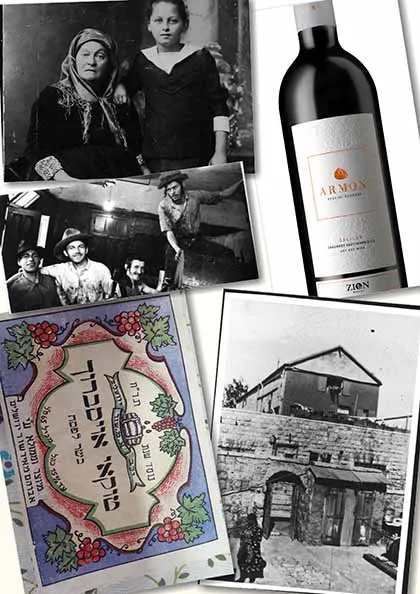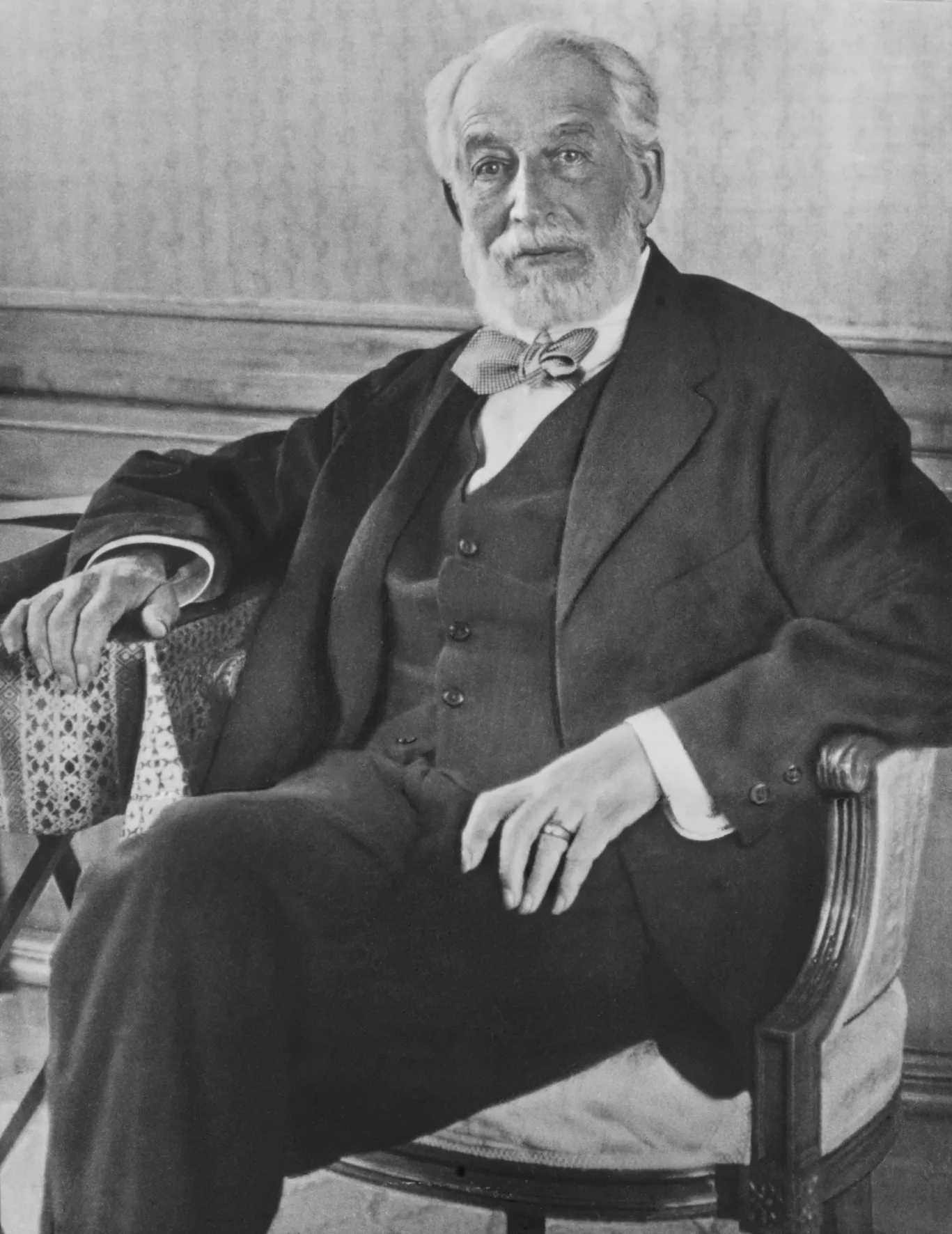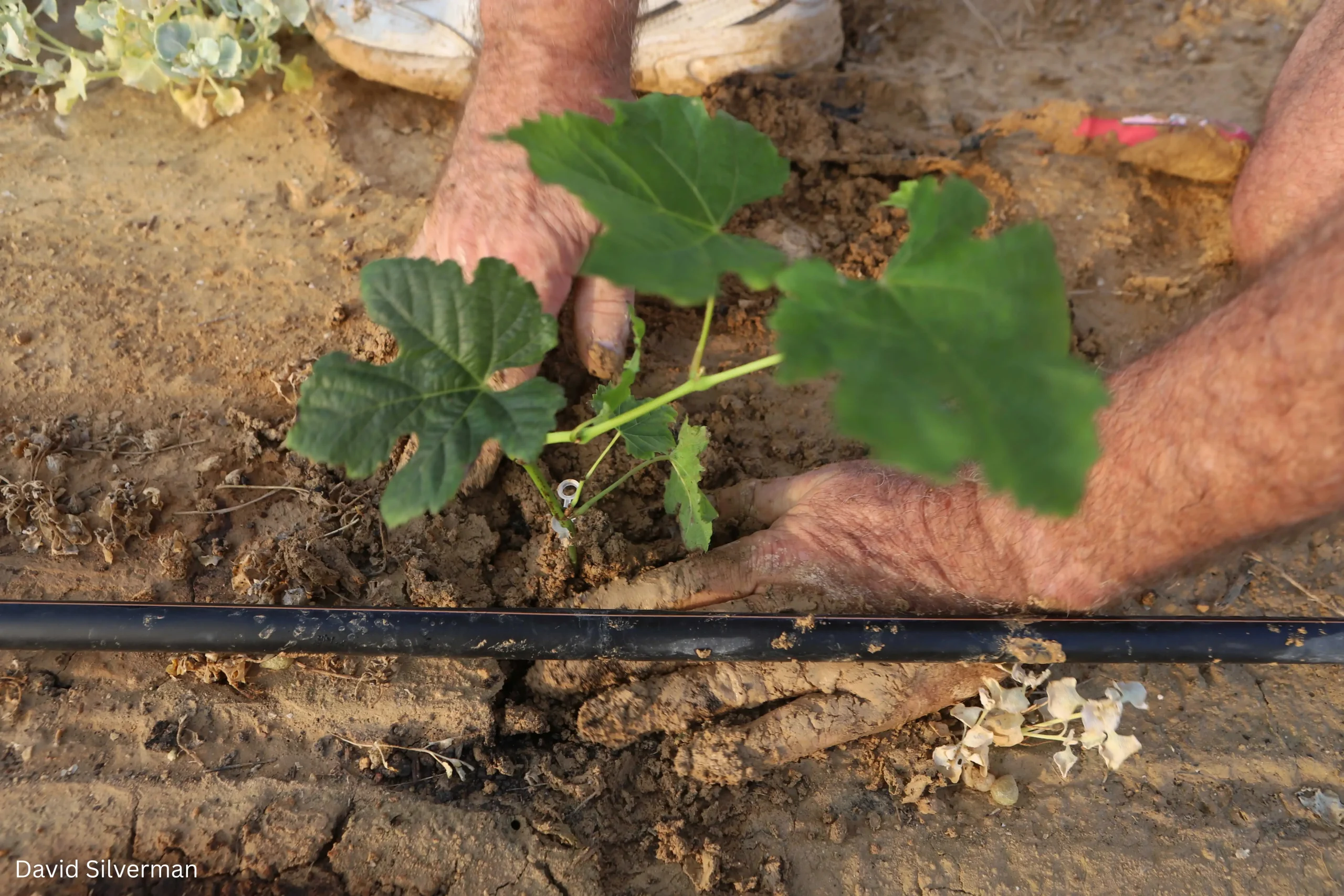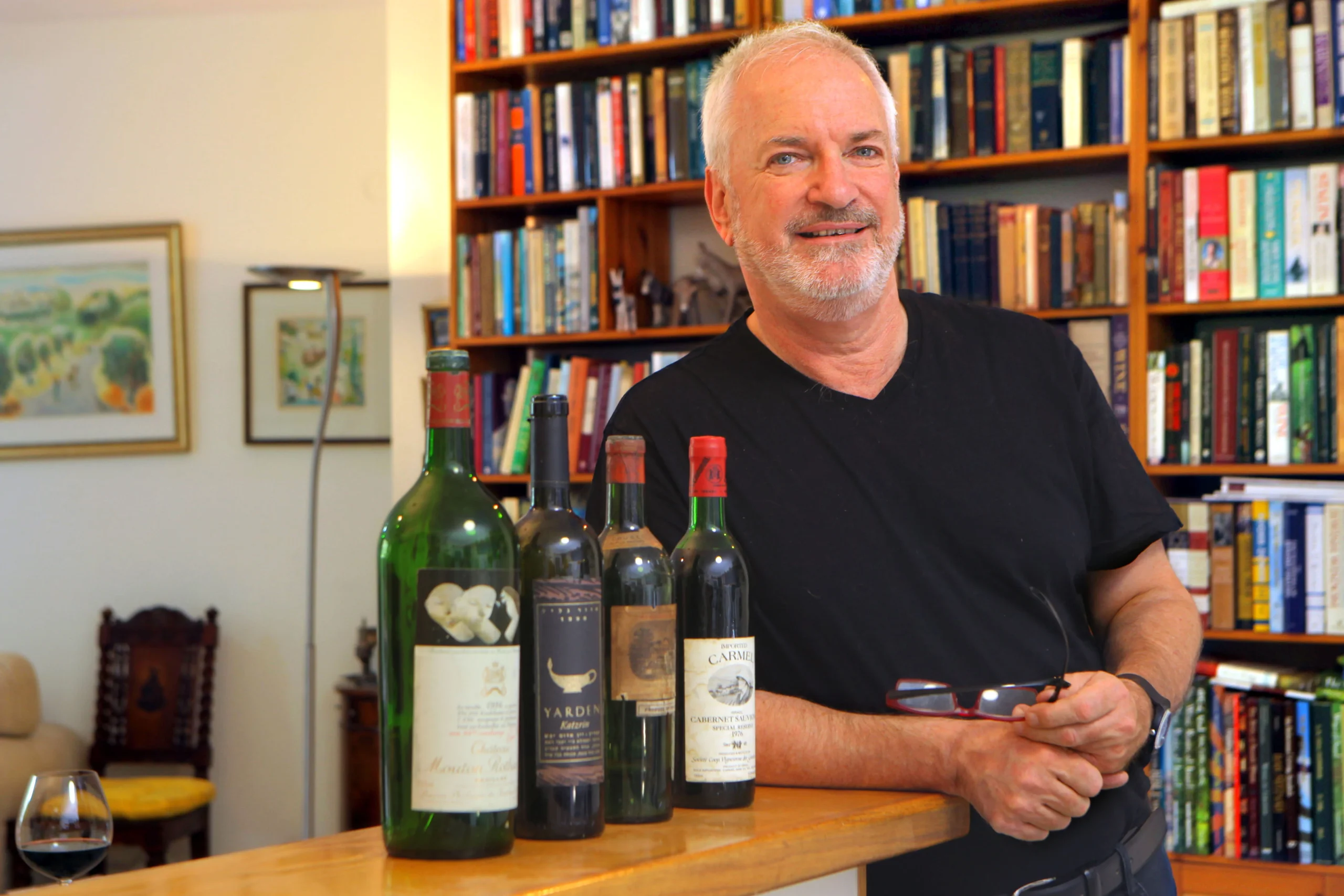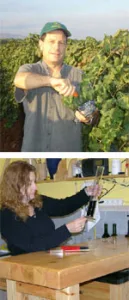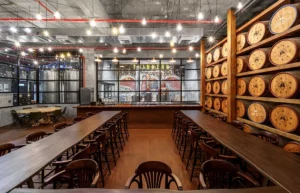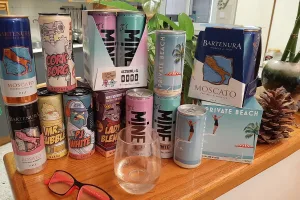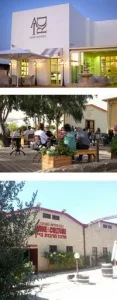Imagine a family journey lasting 170 years, which leads from Haggai Street in the Muslim Quarter of the Old City of Jerusalem, travels via Rappaport Street, Beit Israel in Western Jerusalem and arrives in Haruvim Street in Mishor Adumim, east of Jerusalem. I am referring to the Shor family, which opened their winery way back in 1848 and is today still making wine. This is Israel’s oldest existing wine making family.
Initially it was called Shor Winery, then it became AM Shor Bros and over time as the family grew, it split into four different wineries: Arza, Hacormim, Shimshon and Zion wineries, each with exactly the same roots. Shimshon Winery was eventually sold and is today known as Jerusalem Vineyard Winery. The surviving Shor wineries continue to be owned and managed by the family. What is unique to Zion Winery though, is that it is not only owned by the Shor family, and managed by the Shor family, but also after all these years, the winemaker is still a member of the family!
Zvika Shor is bright, friendly, with a Herzlian beard and striking blue eyes. He has absorbed the proud heritage of the Shor family and lately has been at the center of a whirlwind of changes. Arguably the Shor family as winemakers have advanced more in the last ten years than in the previous 160. Yet Zvika Shor and his predecessors have spanned the history of modern wine in Israel.
Over many years I have researched this family’s history. I visited the Shor wineries at three different stages. I first visited out of curiosity in the early 1990’s. In 2008, I visited again and saw the beginnings of a revolution. Then I sat with Elisha z”l of the 5th generation for hours, listening to his stories, feverishly writing down what he told me. In the last two years I have been again a few times. Recently I had the fortune to spend time with Rabbi Avish Avraham Shor, historian of the Karlin-Stolin Hassidic dynasty and Ehud Shor, amateur historian who was armed with family trees, label albums and family stories. I absorbed all they told me and showed me. I saw a charming video film dating from the 1990’s featuring Shmuel Haim Shor z”l, Rabbi Avish’s father, touring the Old City, and showing where the Shor family began its winemaking dynasty. I then myself had the enlightening experience of retracing the steps on a visit to the Old City with Ehud Shor. It occurred to me how at home these Shors from different eras were, both excitedly pointing out childhood memories, in a place most Israelis fear to visit.
It is an extraordinary story. It began when Rabbi Mordechai Avraham Galin arrived from the Ukraine in 1835 and settled in Safed. The family moved to the Old City of Jerusalem when he became head of the Tiferet Yisrael Yeshiva. His son Yitzhak Galin understood the family could not live on charity alone, so he chose wine as a profession. His sister had married a Baruch Shor, who by chance happened to have a rare license given by the Ottoman Turks for trading in alcohol. So, they changed their name to Shor, used Baruch Shor’s license and opened a winery in 1848 in the Old City of Jerusalem. The first evidence of the family’s involvement in the wine trade was the census commissioned by Moses Montefiore in 1849.
Then it was a very different world. It was a domestic winery, in the Muslim quarter, adjacent to the Kotel Hakatan (Little Western Wall). On my visit with Ehud Shor, I saw the entrance to the Rand House, where the winery was situated. You could see the place the Mezuzah had been, which had since been gauged out.
In those days there was no bottled wine, no labels, no brands and no kashrut certificate. Wine was sold in barrels or small casks. You bought from someone you knew, usually from your family or your community. Grapes came from Hebron vineyards owned by Arabs. Payment was made in advance to reserve the crop. Some of the anonymous local grapes used then, like Bittuni, Dabouki and Zeini, which were ignored for over 150 years, are now being made into wine by the likes of Cremisan, Barkan, Feldstein, Gvaot, Recanati and Taybeh wineries. Wine was categorized as sweet or sour, but over 95% was sweet. They also produced arak, brandy and vodka.
Later on, when the first glass bottles were produced, a family would most likely have only one, which they would have to refill again and again. A service similar to the one Tishbi Winery provides today. The story goes that young daughters would have the task of being sent to the winery to fill the precious bottle. Whereupon they would wrap it in cloth for the swift, furtive walk home, so no-one inappropriate would render the precious wine unkosher by looking at it!
The family was always involved deeper in the wine industry than many realize. When Karl Netter founded the Mikveh Israel Winery in 1870, a member of the Shor family was a partner. Another family member represented Carmel Mizrahi in their branch in Cairo!
There are some priceless family stories handed down. Grapes were delivered to the winery on a drove of donkeys travelling from Hebron. The children used to run after the baskets of grapes to steal the odd bunch of grapes. The Shor family used to wake up in the morning to a courtyard of braying donkeys. Sometimes camels were used to bring the precious cargo but they could only enter via the Damascus Gate where they had the adequate height of alleyway to walk unimpeded.
The third generation was Shmuel and the legendary Rosa Shor. She was a formidable woman. She opened a wine store called Khamra Rosa on Haggai Street, near the cotton market. It probably was not the first shop selling wine and spirits, but because of Rosa’s character, it was the most famous. When her husband passed away, she took over the management of the winery. Her memory lives on. Arab elders still give respect today to a visiting member of the family, as soon as they hear they are related to Rosa.
In 1925 the Shor Winery had to move from the Old City on the request of the British Mandate. They had prepared for this by purchasing property in Beit Israel. The winery moved but the Shor family were still in the Old City when the pogrom of 1929 took place. In the new winery, living quarters was on the top floor, the winery on the ground floor and the cellar, previously a water well, was in the basement.
Glass became cheaper and wine gradually came to be sold in bottles. Bottling was done manually. Alicante became the main variety. Early labels were strictly informative with basic typed information on a white background. Then they began to be used for marketing purposes.
After they had moved to Beit Israel, they occasionally had to load up a donkey to send wine to the shop in the Old City. According to family folklore, a youthful Shor was told to take the donkey and deliver the wine. “But I don’t know the way” he whined. “Don’t worry, the donkey does” was the adult’s reply, Sure enough the donkey navigated the alleyways and the wine was delivered successfully.
The donkey folklore came alive for me, when following the footsteps of the Shors in the Old City. By chance, I came across a photo of a donkey unmistakably carrying bottles of wine, hanging on the wall of an Arab restaurant in Haggai Street. Hilariously, I was swiftly told: “No, they are milk bottles,” by the owner, presumably, as a Muslim, forbidden to drink alcohol!
Two things surprised me about this Haredi, Ashkenazi family. Firstly, the family spoke Arabic, which was logical and practical, so they could communicate with their neighbors and suppliers. How far removed that is from the norm today. Secondly the family served in the IDF. Unfortunately, in the War of Independence, they had to recover from devastating blows.
In 1944, the British Mandate ruled that companies could not be named after families, so the company name was changed from AM Shor Bros to Zion Winery. After the founding of the State of Israel, as the family grew, the two brothers decided to split. Avraham Meir Shor decided to focus on wine and grape juice, and Moshe Shalom Shor concentrated on spirits and liqueurs. There was a wall between the two production centers in the same building, and the folklore tells how sometimes the pervasive smell of arak would reach over into the winery.
Moshe Shalom’s various intitiatives developed into a number of partnerships, including a joint venture with the Teperberg family. There was a long period when the Shor family owned five or six wineries with different names and this was a time when there were not many wineries in Israel! However, what is relevant to today’s reality, is that Arza, Hacormim and Shimshon wineries were founded in the 1950’s by Moshe Shalom’s children, (respectively, Yitzhak, Yechiel and Tzippora, with her husband Yona Mendelson.) Meanwhile Zion Winery quietly continued and grew.
This was the world into which Zvika was born. The winery was his play ground and where he spent his youth. Fetching bottles, bringing samples, he was practically born in a bottle. His grandfather was Avraham Meir and his father, who took over as the winemaker, was Moshe Haim. Such was their devotion, even one hour after the end of Yom Kippur, he recalls rushing to the winery to attend to fermenting grapes. It was a full life dominated by the wine cycle.
The next generation dealt with the growth of the winery. Bottling plants replaced manual work and in 1982 the three Shor family wineries, (Arza, Hacormin and Zion), now found themselves in the same street of Mishor Adumim, (the industrial estate near Maale Adumim.)
In 1992 Zvi Shor became the winemaker, succeeding his father. He entered the winery with the smell of wine in his nostrils from the cradle and a mindset buried in the past; an old world of liquid religion, sweet wines and grape juice. Carignan was by now the leading grape variety used by the winery. The world was changing but it appeared to have passed by Zion Winery. The Golan Heights Winery had made its mark. Carmel Mizrahi, Eliaz, Efrat, Stock and Askalon were about to become Carmel Winery, Binyamina, Teperberg, Barkan and Segal as they strove to reinvent themselves. With Zion Winery, it took longer, but the change when it came was impressive.
Zvi Shor was an autodidact with curiosity, a passion for wine with an ability to change a world view forged from childhood and absorb new things. It all began one harvest in 1995 when a grower rang him up and said “I have some spare Cabernet Sauvignon. Can you use it?” Zvi thought no harm in trying, so he said yes and fermented the wine in a small fiberglass tank in the corner of the winery. When he leant over and put his nose in the container, the power and depth of the aromas was so much greater than anything he had had before, it switched on a light on in his mind. He was hooked. It was an epiphany moment.
For the first time they purchased better quality grapes. After a lifetime in wine, with no ego and being unafraid to ask questions, Zvi Shor started his education again. He went on a winemaking course with Soreq Winery and Wine Academy Course at Ramat Gan College. He liaised a great deal with Shlomo Cohen z”l of The Israel Wine Institute. He watched, listened and learnt. In 2005-6, the winery made the decision to invest in quality. More recently he joined the winemaking forum organized by Victor Schoenfeld and regularly rubbed shoulders with his peers. For the first time in 155 years the family started planting vineyards according to variety. Zvika found he loved the idea of growing the wine and when I arranged to meet him, he explained it was more appropriate to meet in the vineyards.
Zvi bought his first barrels from Teperberg Winery. The space he had was so tight, he had to scramble over the barrels to top up. In 2006 the winery won a gold medal at the Terravino Competition. We who looked on were surprised. So, Zion Winery was making dry, award winning wines for the first time! In 2007 the awards ceremony was held in Eilat and they stole the show by winning four gold medals. I remember the incongruous setting as the white shirted, black frocked haredim went up to receive their well-earned trophies, in Eilat of all places! As Zvi said to me “With food comes an appetite.”
Fortunately, Zvi had colleagues, (or rather, relations), who were his equal in the capacity to change. First cousin Moshe Shor, was, and still is, the CEO. Zvi and Moshe’s fathers were brothers. Moshe has two qualities. He is a bulldozer and he has a fascination with all the winery equipment. He began a process of investing in the winery which is hard to believe. I myself have witnessed the changes. They have built a serious winery, which is spotlessly clean. When I visited recently, there were incongruously a number of Chinese people in the winery. “Who are they?”, I asked. “Oh”, I was told “they are installing a robot for the bottling line!” Usually when I visit, Moshe, true to form, is in the heart of the winery checking on some new equipment. He does not sit at a desk playing the CEO. It is hard for him to tear himself way from the action part of the winery. He has shown incredible drive and ambition to give Zvi the playground that he now has at his disposal.
Zion Winery is now the 6th largest in Israel. They still produce grape juice and kiddush wine, and their inexpensive table wines sold in supermarkets are great value. The leading wines are very respectable and are sold under the Armon label. As for Zvi, he still lives in Beit Israel where he frolicked as a youth. He has four sons and five daughters so the next generation is assured, but will there be a winemaker amongst them? Time will tell. Zvi remains the same modest, smiling, friendly person he has always been, yet it seems as though he has leaped from the ancient world to new world in ten years. He is the embodiment of the Shor family, proud of a history of 170 years of winemaking and continuing the family winemaking tradition for another generation. Far from looking back, his eyes are firmly fixed in the future.
Adam Montefiore has advanced Israeli wines for over 30 years. He is referred to as the ambassador of Israeli wine and is the wine writer for the Jerusalem Post. www.adammontefiore.com


